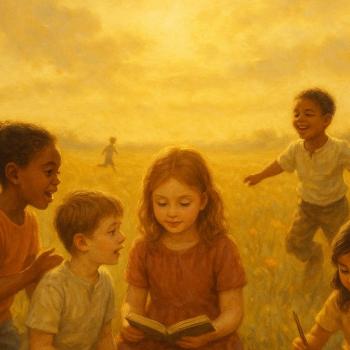
‘For youthe and elde is often at debaat,’ Chaucer’s Miller observes: ‘For young and old are often in debate.’ As I look at recent events in the UK and Ireland, it would seem this much hasn’t changed. If anything, our differences have only grown since the great English poet spun his Canterbury Tales, like a toenail fungus in a sauna.
Nor are things any different as I look West. Over two thirds of young voters in the Keystone State, for example, opted for the Democrat over the Republican in the Fetterman vs Oz midterm battle. That’s quite a generational divide among Pennsylvanians. Nevertheless, for all this intractable division, the Christian Church is well-placed in our communities as a forum for unity. That’s my theme for today.
Church must be the mediator between people at all stages of life, or it means nothing. Christ, you’ll remember, was apoplectic whenever his disciples broke with generational solidarity to shoo the poor kids away. ‘Let the little children come to me,’ Jesus famously said, ‘and do not hinder them’ (Matthew 19.14, NIV). When I hear someone tut because a child made the slightest noise during a sermon, I like to picture the clouds rent asunder and Our Saviour guldering down this verse from on high. That would soon show them.
Here in Britain, the major source of intergenerational strife is our finances. Chancellor Jeremy Hunt, whose American counterpart would be Treasury Secretary Janet Yellen, made a financial statement in Parliament on 17th November. It was received, among younger commentators, about as well as an Ebola diagnosis. Tom Harwood, a 26-year-old journalist for GB News, was particularly disgruntled. He tweeted, ‘politicians block development and raise taxes. It’s like they want to drive my generation into the dirt.’
As Mr Harwood implies, it was a financial statement which rankled for several reasons. On the one hand, HM Government awarded all pensioner households a £300 payment on top of a State Pension increase. On the other hand, annual capital gains exemptions were halved. Recriminations were swift and savage. As one Sunday Times heading ran, “Pensioners escape Jeremy Hunt’s ‘difficult decisions’ as young people face decade of lost growth.” Clearly, there is an actual or perceived rift between the generations’ economic interests.
Another sore spot has been the newfound ascendance of Sinn Féin across Ireland, both North and South. If you’re unfamiliar with Irish politics, let me pull some salient points from the Britannica rundown on the party. ‘Sinn Féin strives for an end to the political partition of the island of Ireland,’ not an illegitimate goal in itself. What some of us like to forget is this: ‘political party that long was widely regarded as the political wing of the Provisional Irish Republican Army (IRA),’ the latter being a paramilitary organisation.
But, as the Britannica notes, ‘Most of Sinn Féin’s supporters are relatively young.’ Liz O’Donnell, in a Sunday Times column, explores why. ‘This is because older voters remember IRA violence and are less likely to vote Sinn Fein,’ O’Donnell reasons. That adds up. ‘Younger voters have no such bias and will support what seems a modern and edgy party that espouses their concerns.’ The party solidified this reputation among Irish young people through their support for the legalisation of same-sex marriage in 2015 and the liberalisation of abortion in 2018.
These are variations on a global theme. Online, a Wildean obsession with youth prevails. Indeed, social media has made youth culture all-pervading. There’s no longer anywhere to hide from its prying tentacles. Fresh-faced influencers abound, from YouTube’s PewDiePie (33) to TikTok’s Charli D’Amelio (18). Anyone born pre-1980, those who don’t see themselves as digital natives, could be forgiven for feeling a bit… left behind. Oh no… here comes the Larry Norman song. I can almost hear the chorus…
Whatever our generational differences, however, everyone has the same spiritual need: to know and worship our Creator, arm in arm with a loving community. Thus, Church is a place where folks of all ages come together for a shared reason. Banish Larry Norman from your mind a second and listen instead to the Casting Crowns ballad, “City on the Hill.” It speaks emotively to the Church as a place where generational diversity must rule.
This is the time of year when the generations collaborate in order to make Advent what it is. In Sunday school, we’ve started going through the kids’ Nativity lines. Casting decisions have been finalised, with last year’s roles redistributed among fresh talent. Big shoutout, as always, to the teacher that remembered who played what in our previous pièce de résistance. Your input is invaluable. The kids could appear onstage in Sesame Street outfits, with a Virgin Snuffy protagonist, and I wouldn’t remember a thing about it.
Meanwhile, the choir is hard at work preparing anthems for our carol service. Thus, if it weren’t for the children’s heart-warming innocence and the musical maturity that only grown-ups have, the Christmas period would utterly flop.
Granted, neither a bunch of tea towels wrapped around heads, nor a chorus of Once in Royal, can bridge our differences for all time. But, if even just for an hour or two, the moments we share in Church do bring us a little closer. What, realistically, would we be doing otherwise? Well, the kids might see the holidays in with interminable gaming in their sweaty bedrooms, leaving the rest of us to muster all the seasonal cheer of a blowtorch accident as we drown the year’s regrets in advocaat.
I think I’ll stick with Little Donkey, thanks.
Naturally, things don’t always go to plan where Christmas is concerned. (Yes, kind reader, a digression beckons.) When I was growing up in the Presbyterian Church, it was tradition for the minister to get someone different every week to light an Advent candle. Inevitably, my summons came. I’m told I got as far as lighting a match before toasting myself on it and running, screaming like a squid in the presence of rice and wasabi, back to my parents. I’m grateful to have only the vaguest recollections of all this!
Then there was the year we brought our new Christmas toys up to the baptistry to show them off. I brought an Action Man figure called Anti-Freeze. Consider my surprise when, upon declaring with obvious joy that I had received Anti-Freeze for Christmas, a howl of confused laughter went up. At such a tender age, I hadn’t yet realised that anti-freeze is more suitable a gift for, say, the family seven-seater than a sweet summer child.
Your patience while I process these childhood traumas has been appreciated. On to the conclusion. Church is, I truly believe, our best hope – in an endlessly more individualistic West – of recovering some semblance of generational solidarity. Church is neither a geriatric home nor a kindergarten. If it’s not a place for all then it’s no church at all.
I was reading up on an Anglican cleric, whose job it was to plant new churches that would focus on evangelising twenty-to-thirty-somethings. I find that an unsettling notion. Fellowships for young families have a place – we have them in Ireland, and they’re very popular – but we should refrain from the notion that sectional groups like these are churches. ‘There is one body and one Spirit, just as you were called to one hope when you were called,’ St. Paul writes, ‘one Lord, one faith, one baptism’ (Ephesians 4.4-5).
How tragic would it be, were we to self-segregate into fellowships for different ages instead of gathering as one diverse people, the Body of Christ. It would thoroughly marketize an already fractious Church. Everyone would shop around until they found a congregation of superficially like-minded individuals – a chosen family, to plunder that worn-out oxymoron – as one might select a bathmat in a DIY store.
‘They broke bread in their homes and ate together with glad and sincere hearts,’ Luke records, ‘praising God and enjoying the favour of all the people’ (Acts 2.46b-47a). Note well: all the people, old and young. We share the one bread and the one baptism but, like any family, we’re not all the same. That is as it should be.
Tonight, I have a kiddie disco to put on for the parish children – along with my fellow Sunday school teachers, the generations making a collective ass of ourselves as we bust our corniest moves. Why not stick on a megamix and leave the kids to crack on? That would only be cheating. No sir, the young and young-at-heart shall dance together. We wouldn’t have it another way, because Church is generational solidarity.
12/15/2022 4:57:54 PM





